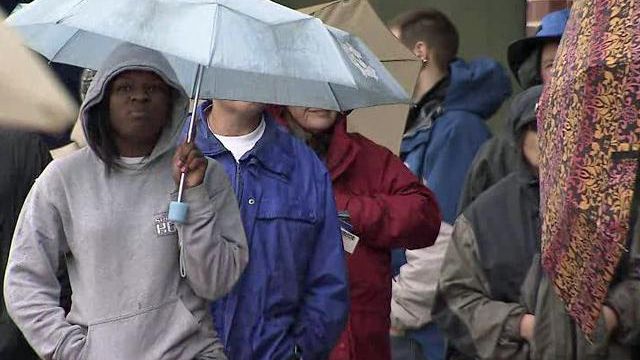Interest high at UNC campus for Obama loan talk
Supporters in Chapel Hill sought shelter from the rain under tents, blankets and umbrellas Sunday as they lined up for tickets to see President Barack Obama speak about student debt this week at the flagship public university in a state at the heart of this year's presidential election.
Posted — UpdatedObama visits the University of North Carolina at Chapel Hill on Tuesday and similar colleges in Colorado and Iowa as he woos young voters by taking about student loans and the rising cost of education. All three are in states Obama won in 2008 but which could go to the likely Republican nominee, Mitt Romney. The Obama campaign sees college-aged voters as a critical constituency.
"We have the power to change what happens in our country, and so the more we learn and the more we know about our candidates, the better prepared we'd be to go to the polls," UNC graduate student Carolina Clark said.
A line of students seeking tickets to hear Obama in Chapel Hill camped out overnight in front of the box office of the university's former basketball auditorium, where he'll speak. The line later snaked down the bleacher steps of the adjoining soccer stadium and curled along the running track encircling the field.
"People started lining up to wait for tickets last night, so it is evident that the student body is excited for him to come," said Anna Ollinger, a 19-year-old sophomore from Barrington, Ill., majoring in linguistics and Spanish. "Obviously, lower interest rates will have a huge impact on many students, so it's an issue that needs to be addressed."
Obama is in the midst of a push to get Congress to extend a law that cut interest rates on a popular federal loan program for low- and middle-income undergraduates. If the law expires, the rates on subsidized Stafford loans will double on July 1, from 3.4 percent to 6.8 percent.
More than 7 million students would be financially squeezed if rates rose, to the cost of an additional $1,000 on average, Education Secretary Arne Duncan said Friday.
But the cost of keeping the interest rates frozen could run $6 billion a year.
The president's visit comes two months after scores of angry students held a raucous protest as the University of North Carolina Board of Governors voted to increase tuition across the system of 16 university campuses by an average of nearly 9 percent, or over $400 a year.
The undergraduate North Carolina resident student currently pays an average tuition and fees of $5,294 a year, not including books and living expenses. It is higher at the system's two flagship schools, with UNC-Chapel Hill students paying $6,823 and North Carolina State University charging $6,964. Average annual tuition and fees at public four-year colleges in the U.S. rose 8 percent this year to $8,244 for in-state students, according to the College Board.
The North Carolina schools remain a bargain compared to other states. The University of Virginia charged new in-state students $11,794 for the 2011-12 academic year, while Penn State University charges underclassmen $15,100.
Perhaps because of the relatively low cost, only half of the 155,263 in-state undergraduates enrolled in the UNC system's schools took out federal student loans in the fall semester of 2010, the last period for which data is available. The 78,497 North Carolina-resident undergraduates borrowed a total of just under $254 million in federal loans, or an average of $3,236 per student.
Freshman David Ortiz, 18, of Potomac, Md., said he's among the lucky ones since he landed a scholarship that will allow him to graduate without borrowing. It's too early for most of his classmates to start worrying how they'll pay off loans after graduation, he said.
"It's not a huge issue that's dominant or looming over people's minds, but definitely I think it will always be an area of concern. Nobody wants to pay higher loans, that's for sure, but I think most people just don't understand extremely well how this will impact them," Ortiz said.
He said he's been watching some of the Republican primary debates and expects to pay increasing attention to the presidential campaign as the time for him to cast his first votes nears.
Obama campaign officials estimate about 8 million voters between the ages of 18 and 21 weren't old enough to vote in 2008 but could be swayed to support the president this time. Whether students will vote in large numbers for Obama again will depend on how their personal finances stack up against others since college graduates have faced high levels of unemployment.
___
Emery Dalesio can be reached at http://twitter.com/emerydalesio
Copyright 2024 by WRAL.com and the Associated Press. All rights reserved. This material may not be published, broadcast, rewritten or redistributed.





